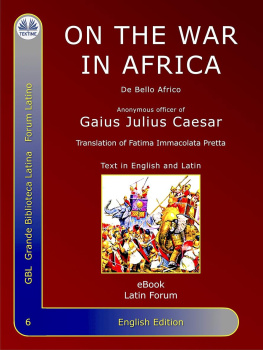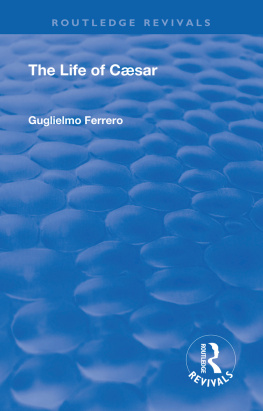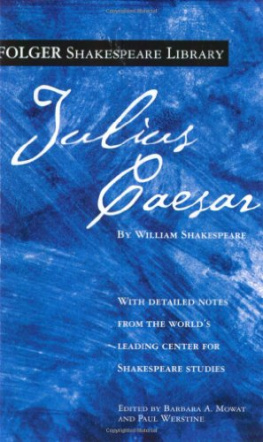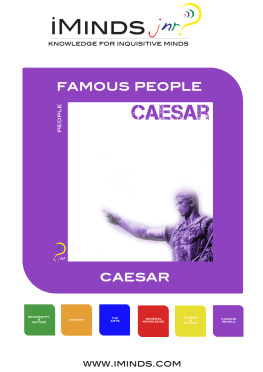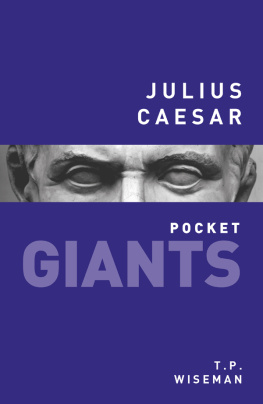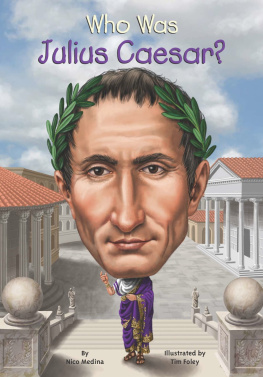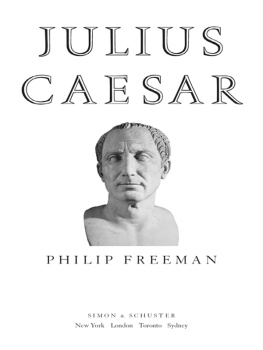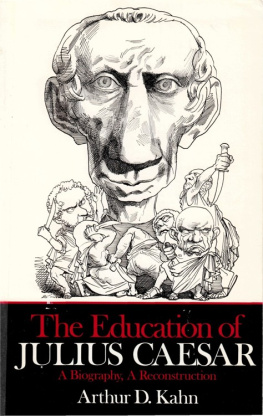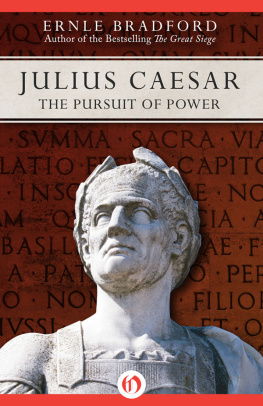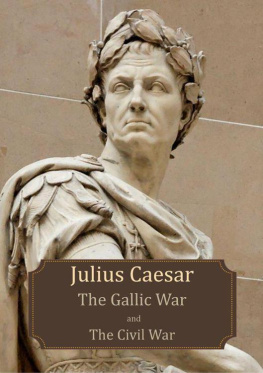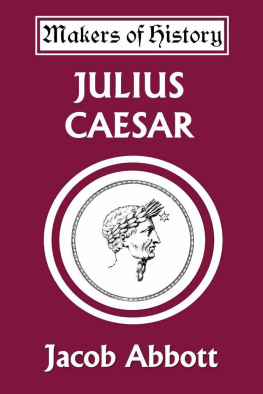Julius Caesars Disease
I dedicate this book to my parents Carla and Stefano and to the dearest memory of my grandparents Rina and Bruno.
Francesco M Galassi
To my beloved wife Leanne and my dear parents Susan and Jamshid.
Hutan Ashrafian
Julius Caesars Disease
A New Diagnosis
Francesco Maria Galassi and Hutan Ashrafian
First published in Great Britain in 2017 by
Pen & Sword History
an imprint of
Pen & Sword Books Ltd
47 Church Street
Barnsley
South Yorkshire
S70 2AS
Copyright Francesco Maria Galassi and Hutan Ashrafian 2017
ISBN 978 1 47387 078 9
eISBN 978 1 47387 080 2
Mobi ISBN 978 1 47387 079 6
The right of Francesco Maria Galassi and Hutan Ashrafian to be identified as the Authors of this Work has been asserted by them in accordance with the Copyright, Designs and Patents Act 1988.
A CIP catalogue record for this book is available from the British Library
All rights reserved. No part of this book may be reproduced or transmitted in any form or by any means, electronic or mechanical including photocopying, recording or by any information storage and retrieval system, without permission from the Publisher in writing.
Pen & Sword Books Ltd incorporates the imprints of Pen & Sword Archaeology, Atlas, Aviation, Battleground, Discovery, Family History, History, Maritime, Military, Naval, Politics, Railways, Select, Transport, True Crime, Fiction, Frontline Books, Leo Cooper, Praetorian Press, Seaforth Publishing and Wharncliffe.
For a complete list of Pen & Sword titles please contact
PEN & SWORD BOOKS LIMITED
47 Church Street, Barnsley, South Yorkshire, S70 2AS, England
E-mail:
Website: www.pen-and-sword.co.uk
Acknowledgements
The authors wish to express their gratitude to all the academics, historians and physicians, whose precious help, observations, critique and suggestions have enriched this research. In particular, words of gratitude go to Imperial College London and the Unit of Surgery and Cancer for having allowed the development of research projects about ancient history analytics in the light of modern medicine; to Professor Paul A Cartledge (A G Leventis Professor of Greek Culture Emeritus, Clare College, The University of Cambridge) for his authoritative insights into the psychology and historical details of Julius Caesars emulation of Alexander, as well as his interest and curiosity for this new theory involving both historical and clinical knowledge; to Professor Christopher B R Pelling (former Regius Professor of Greek at Christ Church College, Oxford University) for his very helpful and powerful commentary on the subtleties of the Plutarchean text; to Professor Robert C T Parker (Wykeham Professor of Ancient History, New College, Oxford University) for his very interesting clarification of the social role of epilepsy in the ancient world; to Professor Federico Maria Muccioli (University of Bologna) for a very interesting conversation on the reasons for the survival of the epileptic theory throughout history. The authors also wish to thank Professor Barry S Strauss (Chair of the History Department at Cornell University) and Professor Carl W Bazil (Chief of the Division of Epilepsy and Sleep at Columbia University) for fruitfully sharing their personal views which, like our own, combine both medicine and studies of the classics on Caesars health, as well as Professor Kristina Killgrove (Department of Anthropology, University of West Florida) for commenting on the theory and for giving their views the prestigious space offered by her successful bioarcheology feature in Forbes Magazine . Kind thanks also to Dr Jessica Hughes (The Open University) for covering the authors research and allowing them to explain it at length in visual form in one of her interviews for the brilliant UK YouTube channel Classics Confidential , and to Professor Trevor Luke (Department of Classics, Florida State University) for giving them his insightful feedback on Caesars last days and his aspiration to being a divine ruler.
Moreover, Francesco M Galassi wishes to thank Professor Frank J Rhli, Dr Thomas Bni and the whole Institute of Evolutionary Medicine (University of Zurich) for allowing him to continue and expand his research scope incorporating the research method and approaches first developed at Bologna and at Imperial College. He also thanks his colleagues Michael Habicht (IEM Zurich) for his precious historical advice and Dr Raffaella Bianucci (Department of Legal Medicine, University of Turin) for her invaluable suggestions on Caesars malaria. He also thanks Dr David L Smith (Selwyn College, The University of Cambridge) for constant and enlightened support of his historical researches, Emeritus Professor Alessandro Ruggeri (DIBINEM, University of Bologna) for his powerful mentorship when he was a student and for his support of the theory, as well as the anthropologist Professor Giorgio Gruppioni (University of Bologna, Ravenna Campus) for his genuine interest in the philologico-clinical method and for offering his personal feedback on the theory. For their interest and support of a further development of the study on Caesar, Francesco Galassi wishes to thank Professor Giovanni Giorgini (Department of Political and Social Sciences, University of Bologna), as well as Mr Lorenzo Gasperoni and Mr Leonardo Belli for liaising to promote classical education in the Romagna area. Last, but far from being the least, special thanks go to his boyhood friend Lorenzo Lazzarini (Ancient Philosophy PhD student at the University of Saint Andrews) for spending long hours analytically dissecting the historical likelihood of epilepsy in Caesars case and critically discussing its potential political and historical relevance and for his kind support of his literary efforts.
For his part, Hutan Ashrafian wishes to thank Professor Stephen Chan (School of Oriental & African Studies) for their whimsical discussions of history and politics, Professor Lord Ara Darzi (Imperial College London) for his continued encouragement in the pursuit of excellence and Professor Thanos Athanasiou (Imperial College London) for enthusiasm and innovative brilliance.
Finally, the two authors wish to thank all the friends, colleagues, distant and close, who have supported this historico-medical study from its first steps and the publication of the research letter in Neurological Sciences in March 2015. Their words and inputs have played a tremendous role in their decision to persevere with this project and they will never forget their positive influence.
Francesco M Galassi & Hutan Ashrafian
Preface
Why Caesars Health Matters and the Need for a Philologico-Clinical Approach
Take we the course which the signs of the gods and the false dealing of our foes point out. The die is cast.
Not long before fulfilling, according to some sources, his dream to invade the Parthian Empire, following in the footsteps of Alexander the Great, he lost his last battle, this time unarmed in that traditionally weapon-free place which was the Senate House at the hands of a handful of conspirators who had deluded themselves into thinking that, through the tyrants excidium , the then long-dead and corrupt res publica could be born again. While his earthly path had come to an abrupt end, his imperial design was taken up by his followers (Mark Antony and Octavian) who extirpated the threat represented by Caesars murderers at Philippi in 42 BC . Octavians ultimate victory over Antony and his lover Cleopatra meant the establishment of a more Italo-centric, primus-inter-pares -styled princedom. Julius Caesar, the most notable exponent and hero of the gens Iulia was elevated to the rank of god and a cult of Divus Iulius was established in Rome, conferring upon him the aura and sacrality of myth.


